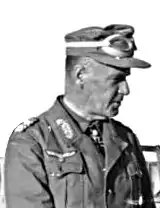The Knight's Cross of the Iron Cross (German: Ritterkreuz des Eisernen Kreuzes) and its variants were the highest awards in the military and paramilitary forces of Nazi Germany during World War II. The Knight's Cross of the Iron Cross was awarded for a wide range of reasons and across all ranks, from a senior commander for skilled leadership of his troops in battle to a low-ranking soldier for a single act of extreme gallantry.[1] A total of 7,321 awards were made between its first presentation on 30 September 1939 and its last bestowal on 17 June 1945.[Note 1] This number is based on the analysis and acceptance of the order commission of the Association of Knight's Cross Recipients (AKCR). Presentations were made to members of the three military branches of the Wehrmacht—the Heer (Army), Kriegsmarine (Navy) and Luftwaffe (Air Force)—as well as the Waffen-SS, the Reichsarbeitsdienst (RAD—Reich Labour Service) and the Volkssturm (German national militia). There were also 43 recipients in the military forces of allies of the Third Reich.[3]
These recipients are listed in the 1986 edition of Walther-Peer Fellgiebel's book, Die Träger des Ritterkreuzes des Eisernen Kreuzes 1939–1945 — The Bearers of the Knight's Cross of the Iron Cross 1939–1945. Fellgiebel was the former chairman and head of the order commission of the AKCR. In 1996, the second edition of this book was published with an addendum delisting 11 of these original recipients. Author Veit Scherzer has cast doubt on a further 193 of these listings. The majority of the disputed recipients had received the award in 1945, when the deteriorating situation of Germany in the final days of World War II in Europe left a number of nominations incomplete and pending in various stages of the approval process.[4]
Listed here are the 82 Knight's Cross recipients of the Wehrmacht and Waffen-SS whose last name starts with "C".[5] The recipients are initially ordered alphabetically by last name. The rank listed is the recipient's rank at the time the Knight's Cross was awarded.
Background
The Knight's Cross of the Iron Cross and its higher grades were based on four separate enactments. The first enactment, Reichsgesetzblatt I S. 1573 of 1 September 1939 instituted the Iron Cross (Eisernes Kreuz), the Knight's Cross of the Iron Cross and the Grand Cross of the Iron Cross (Großkreuz des Eisernen Kreuzes). Article 2 of the enactment mandated that the award of a higher class be preceded by the award of all preceding classes.[6] As the war progressed, some of the recipients of the Knight's Cross distinguished themselves further and a higher grade, the Knight's Cross of the Iron Cross with Oak Leaves (Ritterkreuz des Eisernen Kreuzes mit Eichenlaub), was instituted. The Oak Leaves, as they were commonly referred to, were based on the enactment Reichsgesetzblatt I S. 849 of 3 June 1940.[7] In 1941, two higher grades of the Knight's Cross were instituted. The enactment Reichsgesetzblatt I S. 613 of 28 September 1941 introduced the Knight's Cross of the Iron Cross with Oak Leaves and Swords (Ritterkreuz des Eisernen Kreuzes mit Eichenlaub und Schwertern) and the Knight's Cross of the Iron Cross with Oak Leaves, Swords and Diamonds (Ritterkreuz des Eisernen Kreuzes mit Eichenlaub, Schwertern und Brillanten).[8] At the end of 1944 the final grade, the Knight's Cross of the Iron Cross with Golden Oak Leaves, Swords, and Diamonds (Ritterkreuz des Eisernen Kreuzes mit goldenem Eichenlaub, Schwertern und Brillanten), based on the enactment Reichsgesetzblatt 1945 I S. 11 of 29 December 1944, became the final variant of the Knight's Cross authorized.[9]
Recipients
| Service | Number of presentations | Posthumous presentations |
|---|---|---|
| Heer | 51 | 3 |
| Kriegsmarine | 5 | 0 |
| Luftwaffe | 22 | 1 |
| Waffen-SS | 4 | 1 |
The Oberkommando der Wehrmacht (Supreme Command of the Armed Forces) kept separate Knight's Cross lists for the Heer (Army), Kriegsmarine (Navy), Luftwaffe (Air Force) and Waffen-SS. Within each of these lists a unique sequential number was assigned to each recipient. The same numbering paradigm was applied to the higher grades of the Knight's Cross, one list per grade.[10] Of the 82 awards made to servicemen whose last name starts with "C", ten were later awarded the Knight's Cross of the Iron Cross with Oak Leaves and five presentations were made posthumously. Heer members received 51 of the medals, five went to the Kriegsmarine, 22 to the Luftwaffe, and four to the Waffen-SS.[5]
This along with the + (plus) indicates that a higher grade of Knight's Cross was awarded as well.
This along with the * (asterisk) indicates that the Knight's Cross was awarded posthumously.
Notes
- ↑ Großadmiral and President of Germany Karl Dönitz, Hitler's successor as Head of State (Staatsoberhaupt) and Supreme Commander of the Armed Forces, had ordered the cessation of all promotions and awards as of 11 May 1945 (Dönitz-decree). Consequently the last Knight's Cross awarded to Oberleutnant zur See of the Reserves Georg-Wolfgang Feller on 17 June 1945 must therefore be considered a de facto but not de jure hand-out.[2]
- ↑ For an explanation of the various naming schemes used by the Luftwaffe, Heer, Kriegsmarine and Waffen-SS refer to nomenclature used by the Wehrmacht and Waffen-SS.
- ↑ According to Scherzer as Staffelkapitän of the 1./Jagdgeschwader 77.[11]
- ↑ According to Scherzer a commander-in-chief of Marinegruppenkommando Ost (Naval Group Commando East).[11]
- ↑ According to Scherzer last name is spelled Kastka.[14]
- ↑ According to Scherzer as SS-Hauptsturmführer of the Reserves.[13]
- ↑ According to Scherzer on 25 July 1941.[13]
- 1 2 According to Scherzer on 29 May 1940 as commander of the III./Infanterie-Regiment 16.[17]
- ↑ According to Scherzer as chief of the general staff of the IV. Fliegerkorps.[17]
- 1 2 According to Scherzer as Hauptmann of the Reserves zur Verwendung (for disposition) and chief of the 1./Bau-Bataillon 132.[17]
- ↑ According to Scherzer as a Richtschütze (gunner) in the 2./SS-Panzer-Jagd-Abteilung of the SS-"Totenkopf"-Division.[17]
- ↑ According to Scherzer as a group leader in the 7./SS-Panzergrenadier-Regiment 24 "Danmark".[18]
- ↑ According to Scherzer as commander of Heeres-Artillerie-Abteilung (22 cm-Mörser, bodenständig) 774.[18]
- ↑ According to Scherzer as Leutnant of the Reserves.[18]
- 1 2 According to Scherzer on 22 May 1942 as a pilot in the 1./Jagdgeschwader 77[18]
- ↑ According to Scherzer on 22 August 1943.[22]
- ↑ According to Scherzer as chief of Sturmgeschütz-Begleitkompanie 254 in the 254. Infanterie-Division.[22]
- ↑ According to Scherzer on 25 May 1943.[22]
- ↑ The brackets around the professor and doctor title [Prof. Dr.] denotes that the academic title was attained after the Knight's Cross of the Iron Cross was awarded.
- 1 2 According to Scherzer as Leutnant and a battery officer in the 2./Flak-Regiment 64 (motorized).[22]
- 1 2 According to Scherzer on 19 June 1940 as Staffelkapitän of the 3./Kampfgeschwader 30.[24]
- 1 2 According to Scherzer as Oberleutnant and adjutant of the I./Sturzkampfgeschwader 2 "Immelmann".[27]
- ↑ According to Scherzer in the 2.(gepanzert)/Panzergrenadier-Regiment "Großdeutschland".[27]
References
Citations
- ↑ Williamson & Bujeiro 2004, pp. 3–4.
- ↑ Fellgiebel 2000, p. 4.
- ↑ Fellgiebel 2000, pp. 113–460, 483, 485–487, 492, 494, 498–499, 501, 503, 509.
- ↑ Scherzer 2007, pp. 117–186.
- 1 2 Fellgiebel 2000, pp. 152–156, 488.
- ↑ "Reichsgesetzblatt Teil I S. 1573; 1 September 1939" (PDF). ALEX Österreichische Nationalbibliothek (in German). Reichsministerium des Inneren (Ministry of the Interior). Retrieved 21 February 2008.
- ↑ "Reichsgesetzblatt Teil I S. 849; 3 June 1940" (PDF). ALEX Österreichische Nationalbibliothek (in German). Reichsministerium des Inneren (Ministry of the Interior). Retrieved 21 February 2008.
- ↑ "Reichsgesetzblatt Teil I S. 613; 28 September 1941" (PDF). ALEX Österreichische Nationalbibliothek (in German). Reichsministerium des Inneren (Ministry of the Interior). Retrieved 21 February 2008.
- ↑ "Reichsgesetzblatt 1945 I S. 11; 29 December 1944" (PDF). ALEX Österreichische Nationalbibliothek (in German). Reichsministerium des Inneren (Ministry of the Interior). Retrieved 21 February 2008.
- ↑ Fellgiebel 2000, p. 112.
- 1 2 3 4 5 6 7 8 9 10 11 12 13 14 15 16 17 18 19 20 21 22 23 24 25 26 27 28 Scherzer 2007, p. 257.
- 1 2 3 4 5 6 7 8 9 10 11 12 13 14 Fellgiebel 2000, p. 152.
- 1 2 3 4 5 6 7 8 9 10 11 12 13 14 15 16 17 18 19 20 21 22 23 24 25 26 27 28 29 30 31 Scherzer 2007, p. 258.
- 1 2 3 4 Scherzer 2007, p. 433.
- 1 2 3 4 5 6 7 8 9 10 11 12 13 14 15 16 17 18 19 20 21 22 Fellgiebel 2000, p. 153.
- 1 2 Fellgiebel 2000, pp. 153, 488.
- 1 2 3 4 5 6 7 8 9 10 11 12 13 14 15 16 17 18 19 20 21 22 23 24 25 26 27 28 29 30 31 32 Scherzer 2007, p. 259.
- 1 2 3 4 5 6 7 8 9 10 11 12 13 14 15 16 17 18 19 20 21 22 23 24 25 26 27 28 29 30 31 32 33 34 Scherzer 2007, p. 260.
- 1 2 3 4 5 6 7 8 9 10 11 12 13 14 15 16 17 18 19 20 21 22 23 Fellgiebel 2000, p. 154.
- 1 2 3 4 5 6 7 8 9 10 11 12 13 14 15 16 17 18 19 20 21 22 23 24 25 26 27 28 29 30 31 32 33 34 35 36 37 38 Scherzer 2007, p. 261.
- 1 2 3 4 5 6 7 8 9 10 11 12 13 14 15 16 17 18 19 20 21 Fellgiebel 2000, p. 155.
- 1 2 3 4 5 6 7 8 9 10 11 12 13 14 15 16 17 18 19 20 21 22 23 24 25 26 27 28 29 30 31 32 33 34 35 Scherzer 2007, p. 262.
- ↑ Fellgiebel 2000, pp. 155, 488.
- 1 2 3 4 5 6 7 8 9 10 11 12 13 14 15 16 17 18 19 20 21 22 23 24 25 26 27 28 29 30 31 32 33 34 35 Scherzer 2007, p. 263.
- 1 2 3 Fellgiebel 2000, pp. 155, 489.
- 1 2 3 4 5 6 7 8 9 10 Fellgiebel 2000, p. 156.
- 1 2 3 4 5 6 7 8 9 10 11 12 13 14 15 16 17 Scherzer 2007, p. 264.
Bibliography
- Fellgiebel, Walther-Peer [in German] (2000). Die Träger des Ritterkreuzes des Eisernen Kreuzes 1939–1945 — Die Inhaber der höchsten Auszeichnung des Zweiten Weltkrieges aller Wehrmachtteile [The Bearers of the Knight's Cross of the Iron Cross 1939–1945 — The Owners of the Highest Award of the Second World War of all Wehrmacht Branches] (in German). Friedberg, Germany: Podzun-Pallas. ISBN 978-3-7909-0284-6.
- Scherzer, Veit (2007). Die Ritterkreuzträger 1939–1945 Die Inhaber des Ritterkreuzes des Eisernen Kreuzes 1939 von Heer, Luftwaffe, Kriegsmarine, Waffen-SS, Volkssturm sowie mit Deutschland verbündeter Streitkräfte nach den Unterlagen des Bundesarchives [The Knight's Cross Bearers 1939–1945 The Holders of the Knight's Cross of the Iron Cross 1939 by Army, Air Force, Navy, Waffen-SS, Volkssturm and Allied Forces with Germany According to the Documents of the Federal Archives] (in German). Jena, Germany: Scherzers Militaer-Verlag. ISBN 978-3-938845-17-2.
- Williamson, Gordon; Bujeiro, Ramiro (2004). Knight's Cross and Oak Leaves Recipients 1939–40. Oxford, UK: Osprey Publishing. ISBN 978-1-84176-641-6.
External links
- "Das Bundesarchiv". Military Archive – Freiburg im Breisgau. Archived from the original on 29 December 2010. Retrieved 2 January 2011.
.jpg.webp)
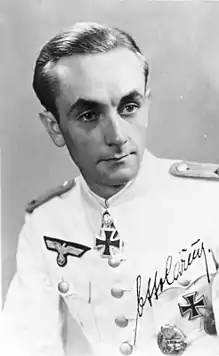
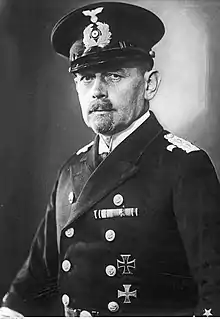

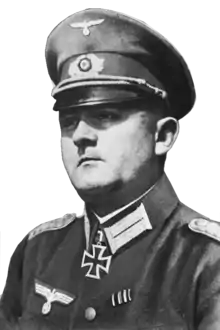
_circa_1940.jpg.webp)

.jpg.webp)
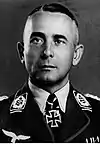
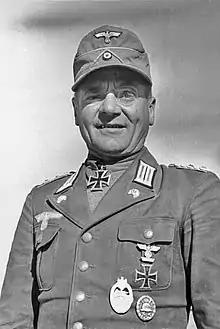
.jpg.webp)
